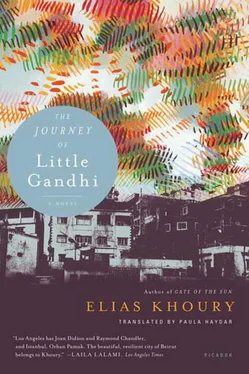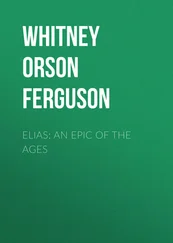Alice took him home, cleaned him up, dressed him in clean clothes, and fed him. She got a taxi and took him to East Beirut, to the nursing home in Ashrafiyyeh.
Sister Efdukiya, who was sitting behind her desk, all covered in black robes with nothing showing but a round white face full of peroxide-bleached white hairs and a wart under her nose with three black hairs growing out of it, refused to take the man in. She said she wanted money. “Please, Sister. I beg you. The man is all alone and doesn’t have anyone. And, after all, he’s a Christian and you’re obligated to take care of him.”
“Impossible,” the nun answered.
The Reverend Amin wept. It was as though a piece of his memory had come back to him, or as if he’d seen himself in the mirror. He wept and made the sign of the cross and shouted “Doxa patri kai huioi.” But neither his weeping nor his prayers did any good with Sister Efdukiya, so Alice paid 1000 liras and told her she’d pay the first of every month.
Alice bent over the Reverend’s hand and kissed it and went back to Beirut.
She went back and told Gandhi. She told him all her stories, except for the officer’s moment of madness. “The officer went crazy. He wasn’t just an officer, he was a leader, he might have become president.”
Alice didn’t know how they allowed her to leave that place. But Gandhi didn’t believe her, and neither did I.
Alice said he died.
“I came and saw him, I covered him with newspapers, there was no one around, his wife disappeared, they all disappeared, and I was all alone.”
Alice said she took him to the cemetery, and she saw the people without faces. “People have become faceless,” she told me. She spoke to them and didn’t get any response, then she left them and went on her way. That’s how the story ended.
“Tell me about him,” I said to her.
“How shall I tell you?” she answered. “I was living as though I were living with him without realizing it. When you live, you don’t notice things. I didn’t notice, I just don’t know.” She shook her head and repeated her sentence. “All I know is, he died, and he died for nothing.”
I recall Alice’s words and try to imagine what happened, but I keep finding holes in the story. All stories are full of holes. We no longer know how to tell stories, we don’t know anything anymore. The story of Little-Gandhi ended. The journey ended, and life ended.
That’s how the story of Abd al-Karim Husn al-Ahmadi al-Mughayiri, otherwise known as Little Gandhi, ended.
As Alice stood amidst the salt and water that drenched the papers she covered Little Gandhi’s body with, Rima was standing on the corner across the street. Alice didn’t see Rima and she didn’t recognize her. Rima had met her once at Little Gandhi’s house, but she didn’t remember her, nor did she remember that meeting, when Ralph came in with that blond girl, who spoke with long pauses between her words. Alice didn’t pay any attention to her at the time, in spite of the fact that the girl had come especially to meet her. Ralph had spoken a lot about Alice, and she wanted to meet her and find out about that strange world hiding underneath the crust of Beirut.
Rima used to tell Ralph she didn’t know anything. How would she know. Even her love for this young man, who worked as a barber in Joseph Tabshurani’s salon behind Maqdisi Street in Hamra, was uncertain. He told her about his relationship with Madame Nuha. She used to smell it on his body when he’d slept with her, that thirst for the other woman. It was as though he clung to her to keep himself from falling. “Love is not like that,” she said to him once. But she was in love with him, or wanted to be in love with him, for after her experience with Hassan, and that feeling that a dreadful chasm had opened up inside her, she decided never to go back to that pit. With Ralph, the pit was nonexistent. There was a kind of silence that enveloped her body. When he came close to her, she felt there was a distance separating him from her, and this distance bothered her sometimes, but it gave her a strange kind of safety. With Hassan, it had been different. She had met him five years earlier in the emergency room of American University Hospital, where she’d come with a group of people who were living in Abi Haidar Tower, to bring a wounded man who’d been hit by some stray bombs. And there started this strange relationship that was impossible to stop. Hassan was different from her. He was from the village of Ayn Unoub in the Aley area. Every weekend he’d go to his village, where he said he felt he belonged. He lived on Verdun Street, but slept in the hospital three nights a week. In two years he was to graduate and go to the States to do his specialization in gynecology. Rima, on the other hand, felt she wasn’t from anywhere. Her father lived in Italy, where he worked for a big pharmaceutical company, and her elderly German mother never stopped drinking whiskey and swearing. Her mother, whom her father divorced after ten years of marriage, with Rima being the only fruit of that marriage, was quickly approaching her death. She couldn’t bear marriage and she couldn’t bear divorce. She fell in love with a man nine years younger than she, and when he married her, she hated him, and turned his life into a living hell. And now she was living in hell. After he divorced her and fled to Italy, this woman, who was nearly sixty years old, became half-crazy. “My mother is half-crazy,” Rima said to Hassan as she told him how she no longer understood her feelings toward her mother and her émigré father and this city she was born in.
At home, Rima spoke German with her mother, and at work, at the Mediterranean Bank, she spoke French, and with her friend the doctor, Arabic. She didn’t know how to speak anymore, as if she’d forgotten the three languages she knew, and started giving this strange impression that she was putting spaces between her words. She’d stop talking in the middle of a sentence, as if she were searching for the right word, or she’d forgotten what she wanted to say. Rima, who’d fled from her mysterious relationship with Hassan, found herself trapped in an even more mysterious relationship with Ralph, or Husn, or Ghassan. The young man with the three names appeared to be more than one person. He slipped between her hands, he seemed strange, as if she didn’t know him. Indeed, she didn’t know him. She met him by chance. She’s the one person in this novel who wasn’t living or working in Hamra, or specifically on Maqdisi Street, and the streets branching from it leading to Bliss Street. Rima was living with her mother in Abi Haidar Tower and felt entirely out of place in Beirut. She came back from France in 1976, because she could no longer stand living alone, and took a job in the Mediterranean Bank, so she wouldn’t be without work. She fell in love with Hassan because he was the first one in this strange city who appeared to her to be a man. She didn’t know what it was she saw in him, because there was nothing very special about him. He had a big nose, thick eyebrows, and arms that seemed shorter than most people’s. He was neither short nor tall, fat nor thin, and in spite of all this she fell into a semimagical relationship with him. From the first day they met, and after he’d finished caring for the wounded man, whose name Rima didn’t know, though she’d brought him and others to the hospital because she happened to be standing on the balcony when the bomb landed, and so she ran to the street and found herself in the hospital, the doctor looked at her, sweat dripping from his forehead, and asked her to buy him a cup of coffee. They went to L’Express and from there to his house. She smoked hashish, got drunk, and laughed. Then she started going almost every night, to smoke with the same group. She found out that Hassan had been involved with every one of the young women she saw at his house. At first she wasn’t upset, but then she began to feel that chasm taking form in her chest. When she’d meet with Hassan, she would feel as if she couldn’t breathe; this strange world this doctor had taken her to made her lose all feeling of herself. She’d sit on the couches that were lined up in the living room, smoke and drink, and listen to music, while he sat there, seemingly unconscious, but she couldn’t bear to live without him. She thought of asking him to marry her, but she got his answer before even asking the question. She could hear it in his boisterous laughter and carefree talk. Rima didn’t know a lot about him. He said he was involved in the fighting at the beginning of the war, but then he became disgusted, this place is disgusting, heading for extinction, he’d go to America and never come back.
Читать дальше












